Smoking Cessation as a Treatment for Mental Illness in the UK
VerifiedAdded on 2022/08/22
|13
|2952
|20
Report
AI Summary
This report presents a research proposal investigating the impact of smoking cessation on mental illness within the UK population. It begins with an introduction outlining the prevalence of smoking and its association with both physical and mental health issues, emphasizing the need for smoking cessation to reduce the burden of mental illness. The study's rationale highlights the established link between smoking and mental health, particularly the belief among smokers that it alleviates stress, anxiety, and mood changes, and the potential for cessation to reduce mental illness. The research aims to determine the association between smoking and various mental illnesses, assess whether cessation reduces mental illness risk, and determine if quitting improves the health of mentally ill individuals. The methodology involves a cross-sectional design with quantitative data collection through questionnaires, purposive sampling of 100 participants, and data analysis using SPSS and meta-analysis. The literature review explores existing research on smoking cessation, mental health, and interventions, including qualitative and correlational studies. Ethical considerations and limitations are addressed, along with a proposed timeline and expected outcomes, with the goal of improving mental health through smoking cessation interventions.
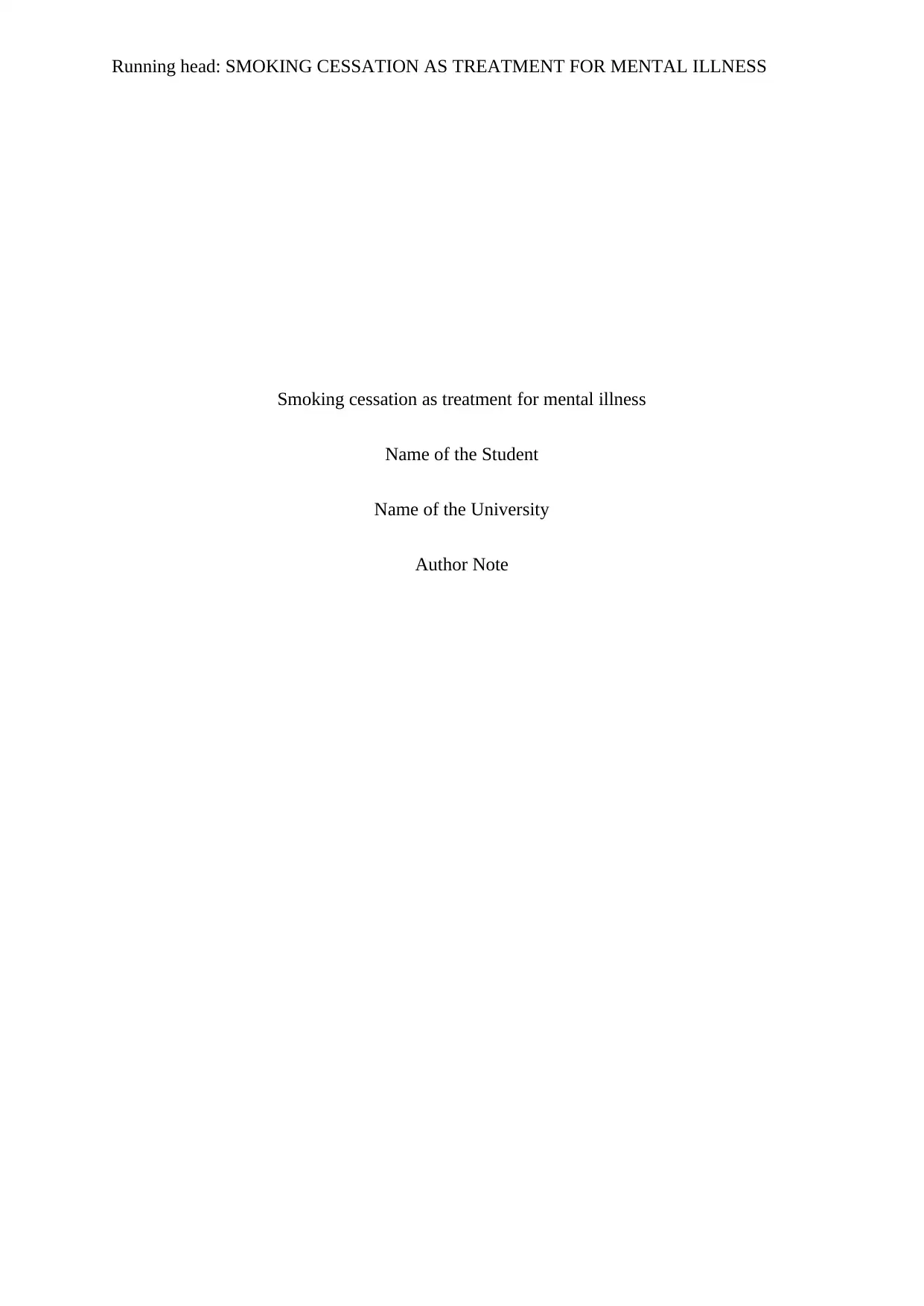
Running head: SMOKING CESSATION AS TREATMENT FOR MENTAL ILLNESS
Smoking cessation as treatment for mental illness
Name of the Student
Name of the University
Author Note
Smoking cessation as treatment for mental illness
Name of the Student
Name of the University
Author Note
Paraphrase This Document
Need a fresh take? Get an instant paraphrase of this document with our AI Paraphraser
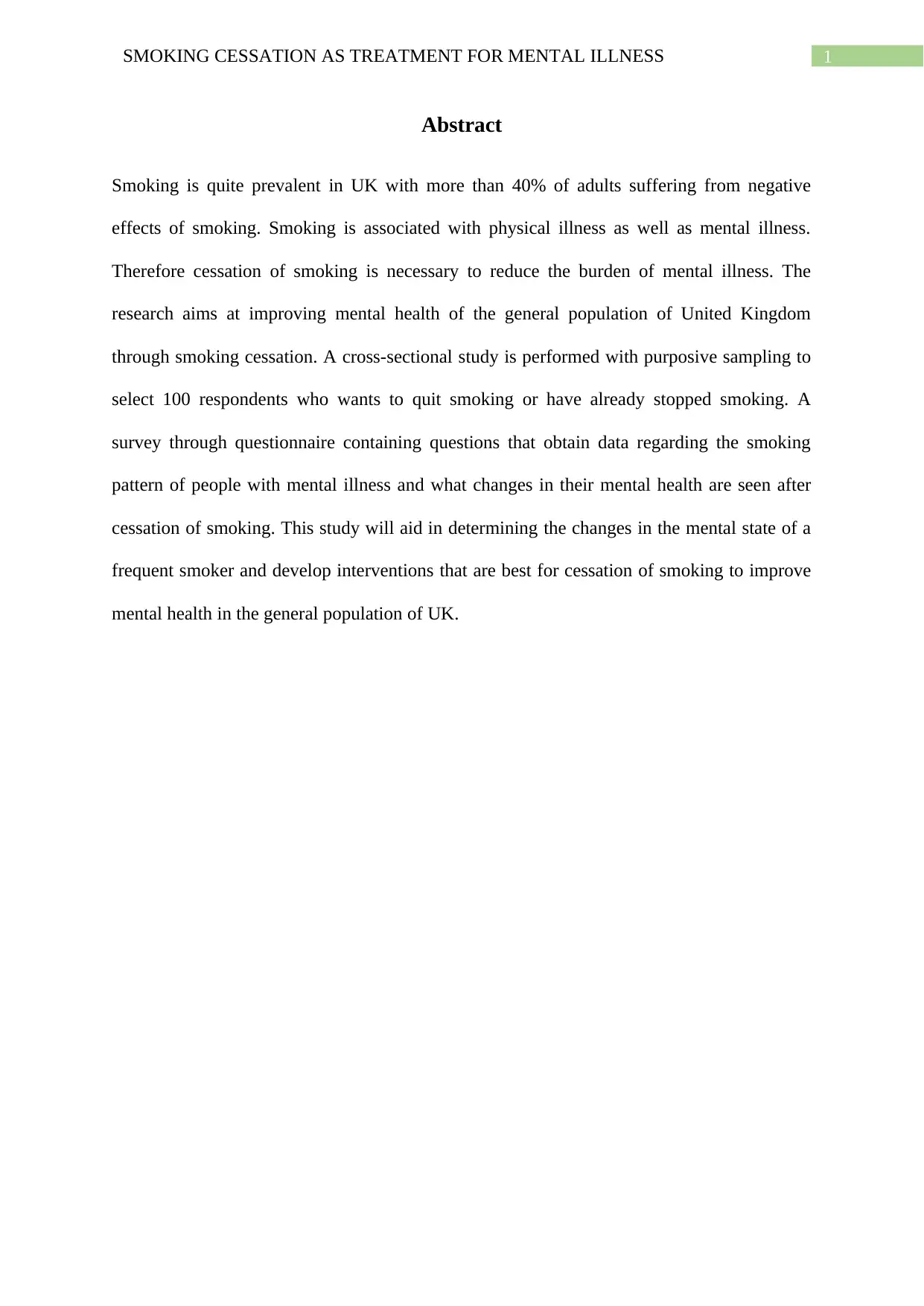
1SMOKING CESSATION AS TREATMENT FOR MENTAL ILLNESS
Abstract
Smoking is quite prevalent in UK with more than 40% of adults suffering from negative
effects of smoking. Smoking is associated with physical illness as well as mental illness.
Therefore cessation of smoking is necessary to reduce the burden of mental illness. The
research aims at improving mental health of the general population of United Kingdom
through smoking cessation. A cross-sectional study is performed with purposive sampling to
select 100 respondents who wants to quit smoking or have already stopped smoking. A
survey through questionnaire containing questions that obtain data regarding the smoking
pattern of people with mental illness and what changes in their mental health are seen after
cessation of smoking. This study will aid in determining the changes in the mental state of a
frequent smoker and develop interventions that are best for cessation of smoking to improve
mental health in the general population of UK.
Abstract
Smoking is quite prevalent in UK with more than 40% of adults suffering from negative
effects of smoking. Smoking is associated with physical illness as well as mental illness.
Therefore cessation of smoking is necessary to reduce the burden of mental illness. The
research aims at improving mental health of the general population of United Kingdom
through smoking cessation. A cross-sectional study is performed with purposive sampling to
select 100 respondents who wants to quit smoking or have already stopped smoking. A
survey through questionnaire containing questions that obtain data regarding the smoking
pattern of people with mental illness and what changes in their mental health are seen after
cessation of smoking. This study will aid in determining the changes in the mental state of a
frequent smoker and develop interventions that are best for cessation of smoking to improve
mental health in the general population of UK.
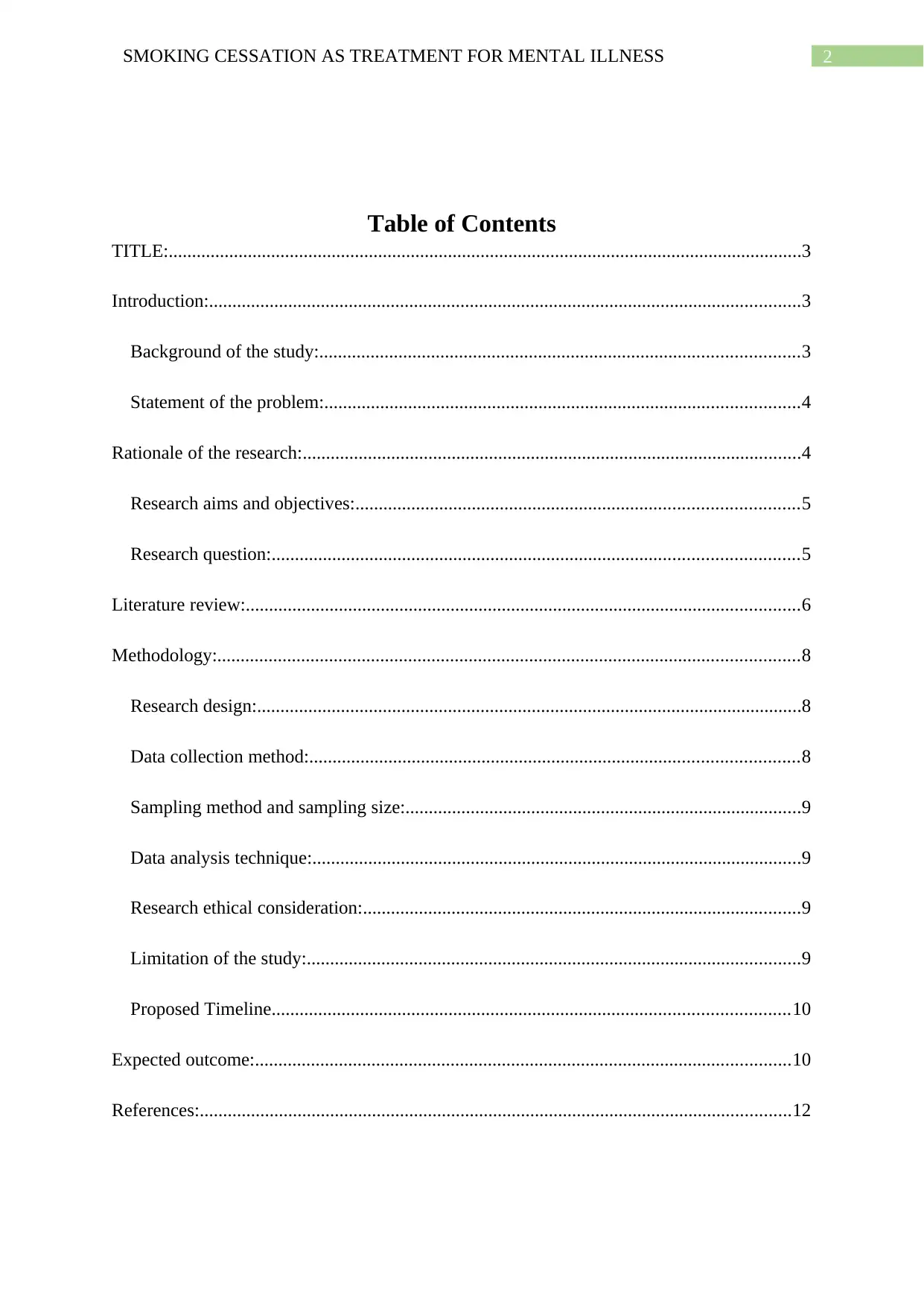
2SMOKING CESSATION AS TREATMENT FOR MENTAL ILLNESS
Table of Contents
TITLE:........................................................................................................................................3
Introduction:...............................................................................................................................3
Background of the study:.......................................................................................................3
Statement of the problem:......................................................................................................4
Rationale of the research:...........................................................................................................4
Research aims and objectives:...............................................................................................5
Research question:.................................................................................................................5
Literature review:.......................................................................................................................6
Methodology:.............................................................................................................................8
Research design:.....................................................................................................................8
Data collection method:.........................................................................................................8
Sampling method and sampling size:.....................................................................................9
Data analysis technique:.........................................................................................................9
Research ethical consideration:..............................................................................................9
Limitation of the study:..........................................................................................................9
Proposed Timeline...............................................................................................................10
Expected outcome:...................................................................................................................10
References:...............................................................................................................................12
Table of Contents
TITLE:........................................................................................................................................3
Introduction:...............................................................................................................................3
Background of the study:.......................................................................................................3
Statement of the problem:......................................................................................................4
Rationale of the research:...........................................................................................................4
Research aims and objectives:...............................................................................................5
Research question:.................................................................................................................5
Literature review:.......................................................................................................................6
Methodology:.............................................................................................................................8
Research design:.....................................................................................................................8
Data collection method:.........................................................................................................8
Sampling method and sampling size:.....................................................................................9
Data analysis technique:.........................................................................................................9
Research ethical consideration:..............................................................................................9
Limitation of the study:..........................................................................................................9
Proposed Timeline...............................................................................................................10
Expected outcome:...................................................................................................................10
References:...............................................................................................................................12
⊘ This is a preview!⊘
Do you want full access?
Subscribe today to unlock all pages.

Trusted by 1+ million students worldwide
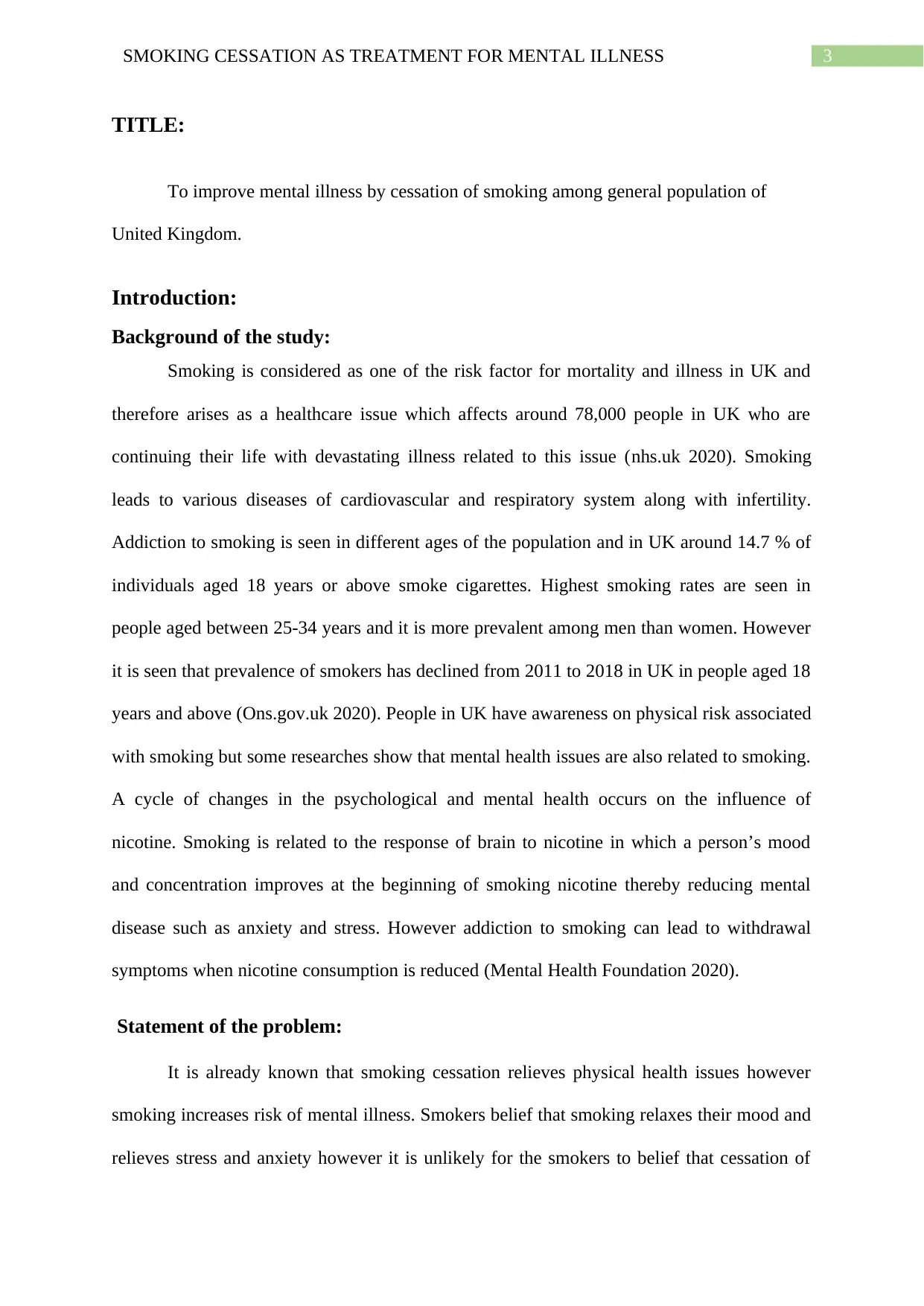
3SMOKING CESSATION AS TREATMENT FOR MENTAL ILLNESS
TITLE:
To improve mental illness by cessation of smoking among general population of
United Kingdom.
Introduction:
Background of the study:
Smoking is considered as one of the risk factor for mortality and illness in UK and
therefore arises as a healthcare issue which affects around 78,000 people in UK who are
continuing their life with devastating illness related to this issue (nhs.uk 2020). Smoking
leads to various diseases of cardiovascular and respiratory system along with infertility.
Addiction to smoking is seen in different ages of the population and in UK around 14.7 % of
individuals aged 18 years or above smoke cigarettes. Highest smoking rates are seen in
people aged between 25-34 years and it is more prevalent among men than women. However
it is seen that prevalence of smokers has declined from 2011 to 2018 in UK in people aged 18
years and above (Ons.gov.uk 2020). People in UK have awareness on physical risk associated
with smoking but some researches show that mental health issues are also related to smoking.
A cycle of changes in the psychological and mental health occurs on the influence of
nicotine. Smoking is related to the response of brain to nicotine in which a person’s mood
and concentration improves at the beginning of smoking nicotine thereby reducing mental
disease such as anxiety and stress. However addiction to smoking can lead to withdrawal
symptoms when nicotine consumption is reduced (Mental Health Foundation 2020).
Statement of the problem:
It is already known that smoking cessation relieves physical health issues however
smoking increases risk of mental illness. Smokers belief that smoking relaxes their mood and
relieves stress and anxiety however it is unlikely for the smokers to belief that cessation of
TITLE:
To improve mental illness by cessation of smoking among general population of
United Kingdom.
Introduction:
Background of the study:
Smoking is considered as one of the risk factor for mortality and illness in UK and
therefore arises as a healthcare issue which affects around 78,000 people in UK who are
continuing their life with devastating illness related to this issue (nhs.uk 2020). Smoking
leads to various diseases of cardiovascular and respiratory system along with infertility.
Addiction to smoking is seen in different ages of the population and in UK around 14.7 % of
individuals aged 18 years or above smoke cigarettes. Highest smoking rates are seen in
people aged between 25-34 years and it is more prevalent among men than women. However
it is seen that prevalence of smokers has declined from 2011 to 2018 in UK in people aged 18
years and above (Ons.gov.uk 2020). People in UK have awareness on physical risk associated
with smoking but some researches show that mental health issues are also related to smoking.
A cycle of changes in the psychological and mental health occurs on the influence of
nicotine. Smoking is related to the response of brain to nicotine in which a person’s mood
and concentration improves at the beginning of smoking nicotine thereby reducing mental
disease such as anxiety and stress. However addiction to smoking can lead to withdrawal
symptoms when nicotine consumption is reduced (Mental Health Foundation 2020).
Statement of the problem:
It is already known that smoking cessation relieves physical health issues however
smoking increases risk of mental illness. Smokers belief that smoking relaxes their mood and
relieves stress and anxiety however it is unlikely for the smokers to belief that cessation of
Paraphrase This Document
Need a fresh take? Get an instant paraphrase of this document with our AI Paraphraser
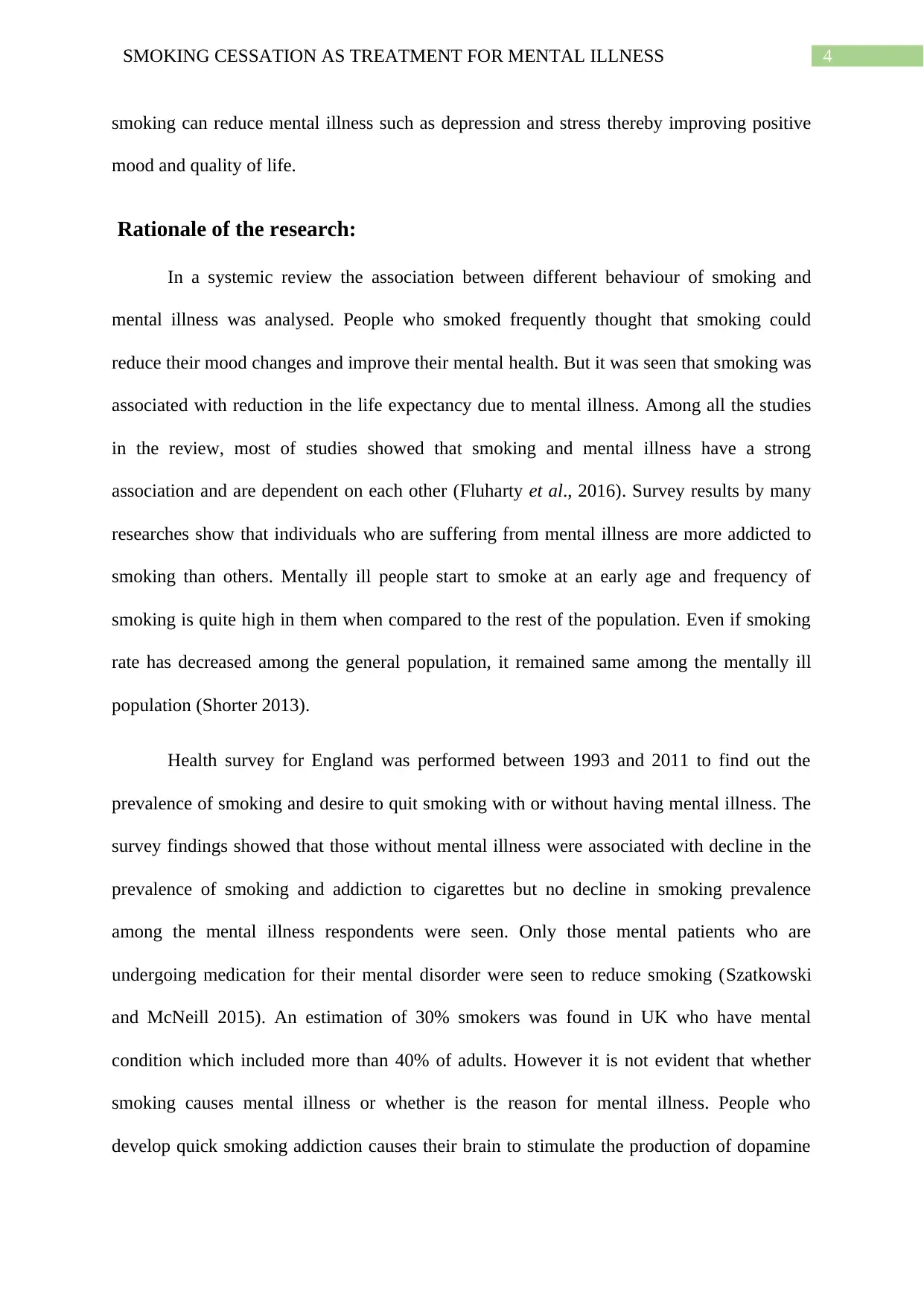
4SMOKING CESSATION AS TREATMENT FOR MENTAL ILLNESS
smoking can reduce mental illness such as depression and stress thereby improving positive
mood and quality of life.
Rationale of the research:
In a systemic review the association between different behaviour of smoking and
mental illness was analysed. People who smoked frequently thought that smoking could
reduce their mood changes and improve their mental health. But it was seen that smoking was
associated with reduction in the life expectancy due to mental illness. Among all the studies
in the review, most of studies showed that smoking and mental illness have a strong
association and are dependent on each other (Fluharty et al., 2016). Survey results by many
researches show that individuals who are suffering from mental illness are more addicted to
smoking than others. Mentally ill people start to smoke at an early age and frequency of
smoking is quite high in them when compared to the rest of the population. Even if smoking
rate has decreased among the general population, it remained same among the mentally ill
population (Shorter 2013).
Health survey for England was performed between 1993 and 2011 to find out the
prevalence of smoking and desire to quit smoking with or without having mental illness. The
survey findings showed that those without mental illness were associated with decline in the
prevalence of smoking and addiction to cigarettes but no decline in smoking prevalence
among the mental illness respondents were seen. Only those mental patients who are
undergoing medication for their mental disorder were seen to reduce smoking (Szatkowski
and McNeill 2015). An estimation of 30% smokers was found in UK who have mental
condition which included more than 40% of adults. However it is not evident that whether
smoking causes mental illness or whether is the reason for mental illness. People who
develop quick smoking addiction causes their brain to stimulate the production of dopamine
smoking can reduce mental illness such as depression and stress thereby improving positive
mood and quality of life.
Rationale of the research:
In a systemic review the association between different behaviour of smoking and
mental illness was analysed. People who smoked frequently thought that smoking could
reduce their mood changes and improve their mental health. But it was seen that smoking was
associated with reduction in the life expectancy due to mental illness. Among all the studies
in the review, most of studies showed that smoking and mental illness have a strong
association and are dependent on each other (Fluharty et al., 2016). Survey results by many
researches show that individuals who are suffering from mental illness are more addicted to
smoking than others. Mentally ill people start to smoke at an early age and frequency of
smoking is quite high in them when compared to the rest of the population. Even if smoking
rate has decreased among the general population, it remained same among the mentally ill
population (Shorter 2013).
Health survey for England was performed between 1993 and 2011 to find out the
prevalence of smoking and desire to quit smoking with or without having mental illness. The
survey findings showed that those without mental illness were associated with decline in the
prevalence of smoking and addiction to cigarettes but no decline in smoking prevalence
among the mental illness respondents were seen. Only those mental patients who are
undergoing medication for their mental disorder were seen to reduce smoking (Szatkowski
and McNeill 2015). An estimation of 30% smokers was found in UK who have mental
condition which included more than 40% of adults. However it is not evident that whether
smoking causes mental illness or whether is the reason for mental illness. People who
develop quick smoking addiction causes their brain to stimulate the production of dopamine
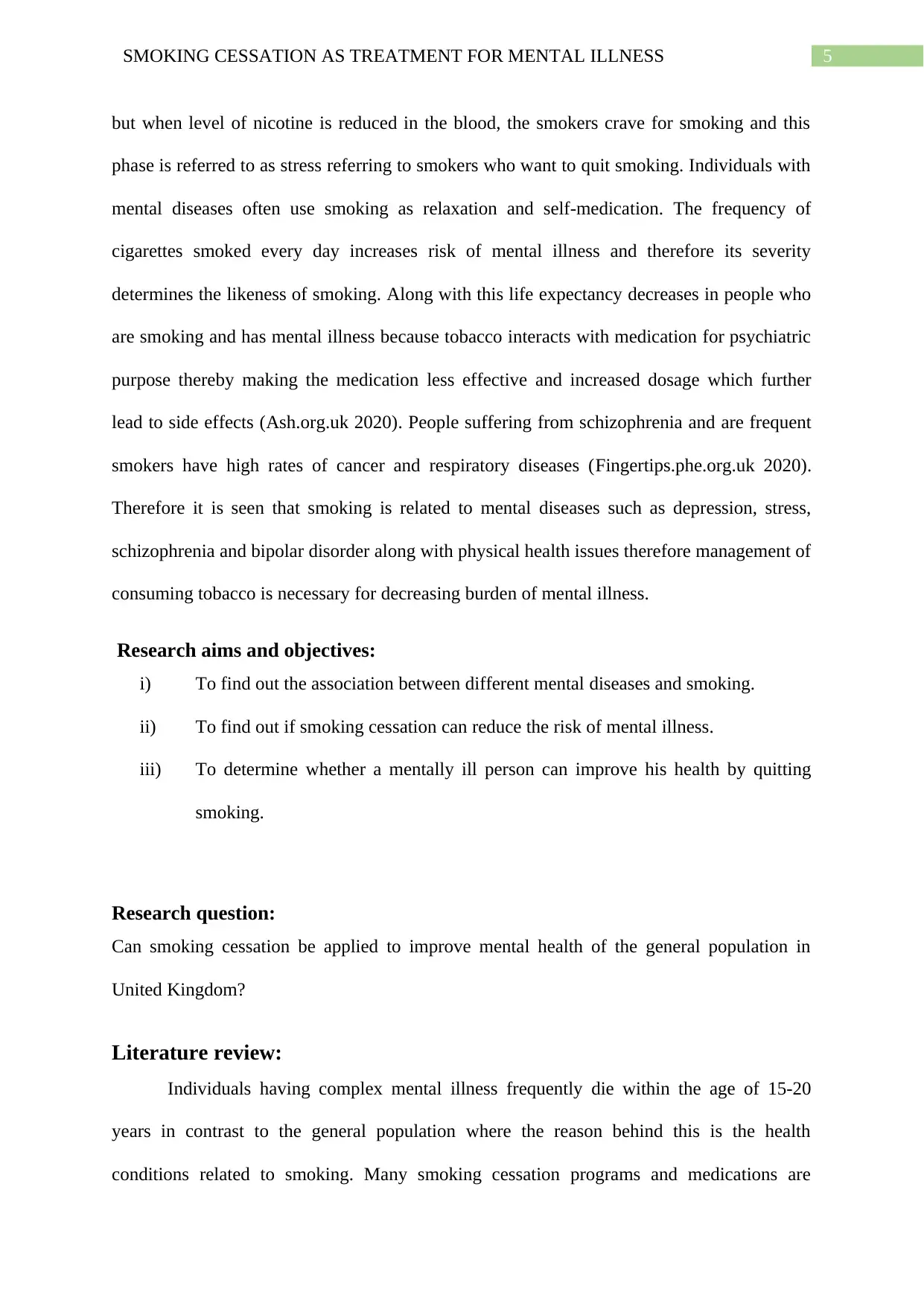
5SMOKING CESSATION AS TREATMENT FOR MENTAL ILLNESS
but when level of nicotine is reduced in the blood, the smokers crave for smoking and this
phase is referred to as stress referring to smokers who want to quit smoking. Individuals with
mental diseases often use smoking as relaxation and self-medication. The frequency of
cigarettes smoked every day increases risk of mental illness and therefore its severity
determines the likeness of smoking. Along with this life expectancy decreases in people who
are smoking and has mental illness because tobacco interacts with medication for psychiatric
purpose thereby making the medication less effective and increased dosage which further
lead to side effects (Ash.org.uk 2020). People suffering from schizophrenia and are frequent
smokers have high rates of cancer and respiratory diseases (Fingertips.phe.org.uk 2020).
Therefore it is seen that smoking is related to mental diseases such as depression, stress,
schizophrenia and bipolar disorder along with physical health issues therefore management of
consuming tobacco is necessary for decreasing burden of mental illness.
Research aims and objectives:
i) To find out the association between different mental diseases and smoking.
ii) To find out if smoking cessation can reduce the risk of mental illness.
iii) To determine whether a mentally ill person can improve his health by quitting
smoking.
Research question:
Can smoking cessation be applied to improve mental health of the general population in
United Kingdom?
Literature review:
Individuals having complex mental illness frequently die within the age of 15-20
years in contrast to the general population where the reason behind this is the health
conditions related to smoking. Many smoking cessation programs and medications are
but when level of nicotine is reduced in the blood, the smokers crave for smoking and this
phase is referred to as stress referring to smokers who want to quit smoking. Individuals with
mental diseases often use smoking as relaxation and self-medication. The frequency of
cigarettes smoked every day increases risk of mental illness and therefore its severity
determines the likeness of smoking. Along with this life expectancy decreases in people who
are smoking and has mental illness because tobacco interacts with medication for psychiatric
purpose thereby making the medication less effective and increased dosage which further
lead to side effects (Ash.org.uk 2020). People suffering from schizophrenia and are frequent
smokers have high rates of cancer and respiratory diseases (Fingertips.phe.org.uk 2020).
Therefore it is seen that smoking is related to mental diseases such as depression, stress,
schizophrenia and bipolar disorder along with physical health issues therefore management of
consuming tobacco is necessary for decreasing burden of mental illness.
Research aims and objectives:
i) To find out the association between different mental diseases and smoking.
ii) To find out if smoking cessation can reduce the risk of mental illness.
iii) To determine whether a mentally ill person can improve his health by quitting
smoking.
Research question:
Can smoking cessation be applied to improve mental health of the general population in
United Kingdom?
Literature review:
Individuals having complex mental illness frequently die within the age of 15-20
years in contrast to the general population where the reason behind this is the health
conditions related to smoking. Many smoking cessation programs and medications are
⊘ This is a preview!⊘
Do you want full access?
Subscribe today to unlock all pages.

Trusted by 1+ million students worldwide
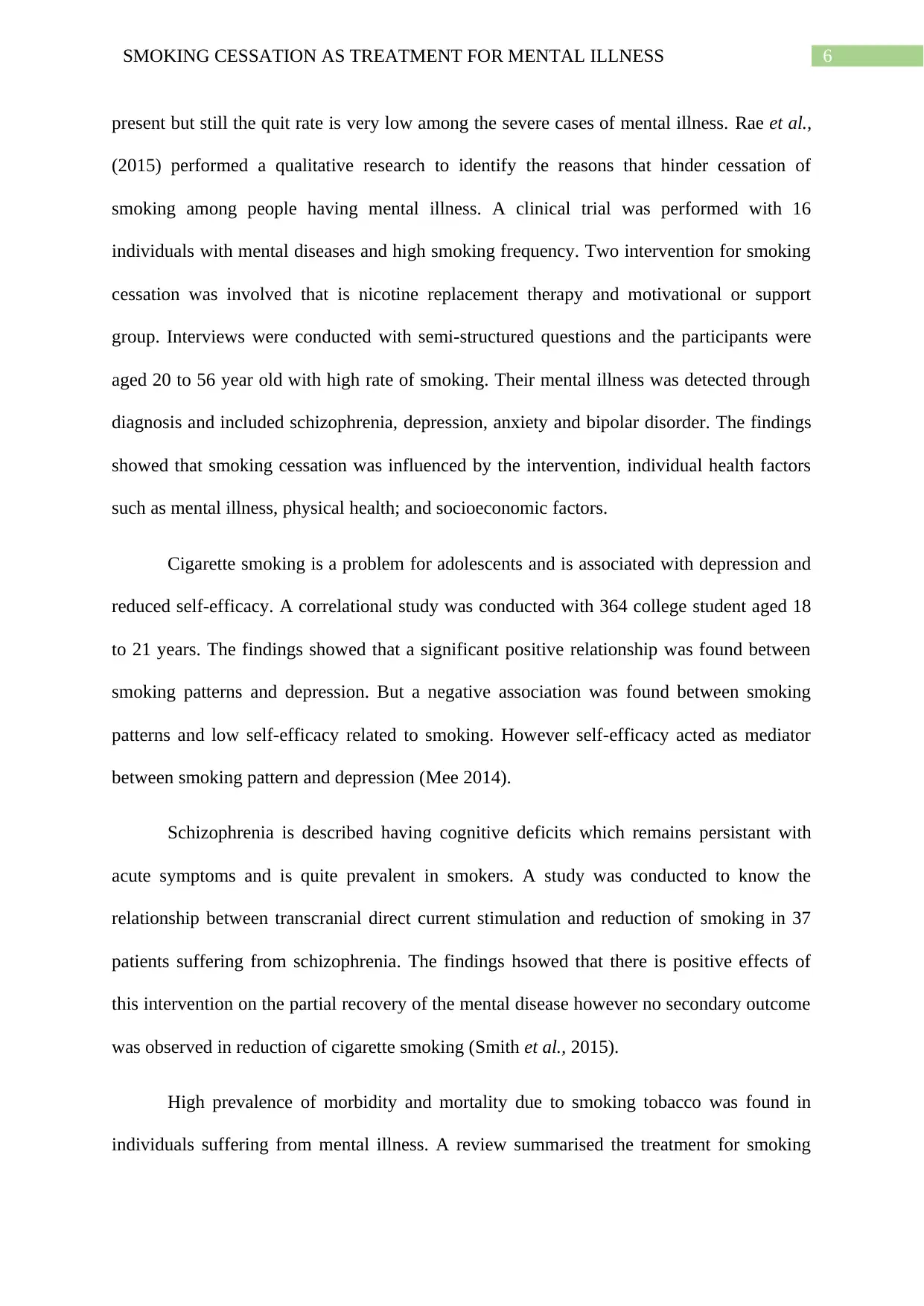
6SMOKING CESSATION AS TREATMENT FOR MENTAL ILLNESS
present but still the quit rate is very low among the severe cases of mental illness. Rae et al.,
(2015) performed a qualitative research to identify the reasons that hinder cessation of
smoking among people having mental illness. A clinical trial was performed with 16
individuals with mental diseases and high smoking frequency. Two intervention for smoking
cessation was involved that is nicotine replacement therapy and motivational or support
group. Interviews were conducted with semi-structured questions and the participants were
aged 20 to 56 year old with high rate of smoking. Their mental illness was detected through
diagnosis and included schizophrenia, depression, anxiety and bipolar disorder. The findings
showed that smoking cessation was influenced by the intervention, individual health factors
such as mental illness, physical health; and socioeconomic factors.
Cigarette smoking is a problem for adolescents and is associated with depression and
reduced self-efficacy. A correlational study was conducted with 364 college student aged 18
to 21 years. The findings showed that a significant positive relationship was found between
smoking patterns and depression. But a negative association was found between smoking
patterns and low self-efficacy related to smoking. However self-efficacy acted as mediator
between smoking pattern and depression (Mee 2014).
Schizophrenia is described having cognitive deficits which remains persistant with
acute symptoms and is quite prevalent in smokers. A study was conducted to know the
relationship between transcranial direct current stimulation and reduction of smoking in 37
patients suffering from schizophrenia. The findings hsowed that there is positive effects of
this intervention on the partial recovery of the mental disease however no secondary outcome
was observed in reduction of cigarette smoking (Smith et al., 2015).
High prevalence of morbidity and mortality due to smoking tobacco was found in
individuals suffering from mental illness. A review summarised the treatment for smoking
present but still the quit rate is very low among the severe cases of mental illness. Rae et al.,
(2015) performed a qualitative research to identify the reasons that hinder cessation of
smoking among people having mental illness. A clinical trial was performed with 16
individuals with mental diseases and high smoking frequency. Two intervention for smoking
cessation was involved that is nicotine replacement therapy and motivational or support
group. Interviews were conducted with semi-structured questions and the participants were
aged 20 to 56 year old with high rate of smoking. Their mental illness was detected through
diagnosis and included schizophrenia, depression, anxiety and bipolar disorder. The findings
showed that smoking cessation was influenced by the intervention, individual health factors
such as mental illness, physical health; and socioeconomic factors.
Cigarette smoking is a problem for adolescents and is associated with depression and
reduced self-efficacy. A correlational study was conducted with 364 college student aged 18
to 21 years. The findings showed that a significant positive relationship was found between
smoking patterns and depression. But a negative association was found between smoking
patterns and low self-efficacy related to smoking. However self-efficacy acted as mediator
between smoking pattern and depression (Mee 2014).
Schizophrenia is described having cognitive deficits which remains persistant with
acute symptoms and is quite prevalent in smokers. A study was conducted to know the
relationship between transcranial direct current stimulation and reduction of smoking in 37
patients suffering from schizophrenia. The findings hsowed that there is positive effects of
this intervention on the partial recovery of the mental disease however no secondary outcome
was observed in reduction of cigarette smoking (Smith et al., 2015).
High prevalence of morbidity and mortality due to smoking tobacco was found in
individuals suffering from mental illness. A review summarised the treatment for smoking
Paraphrase This Document
Need a fresh take? Get an instant paraphrase of this document with our AI Paraphraser
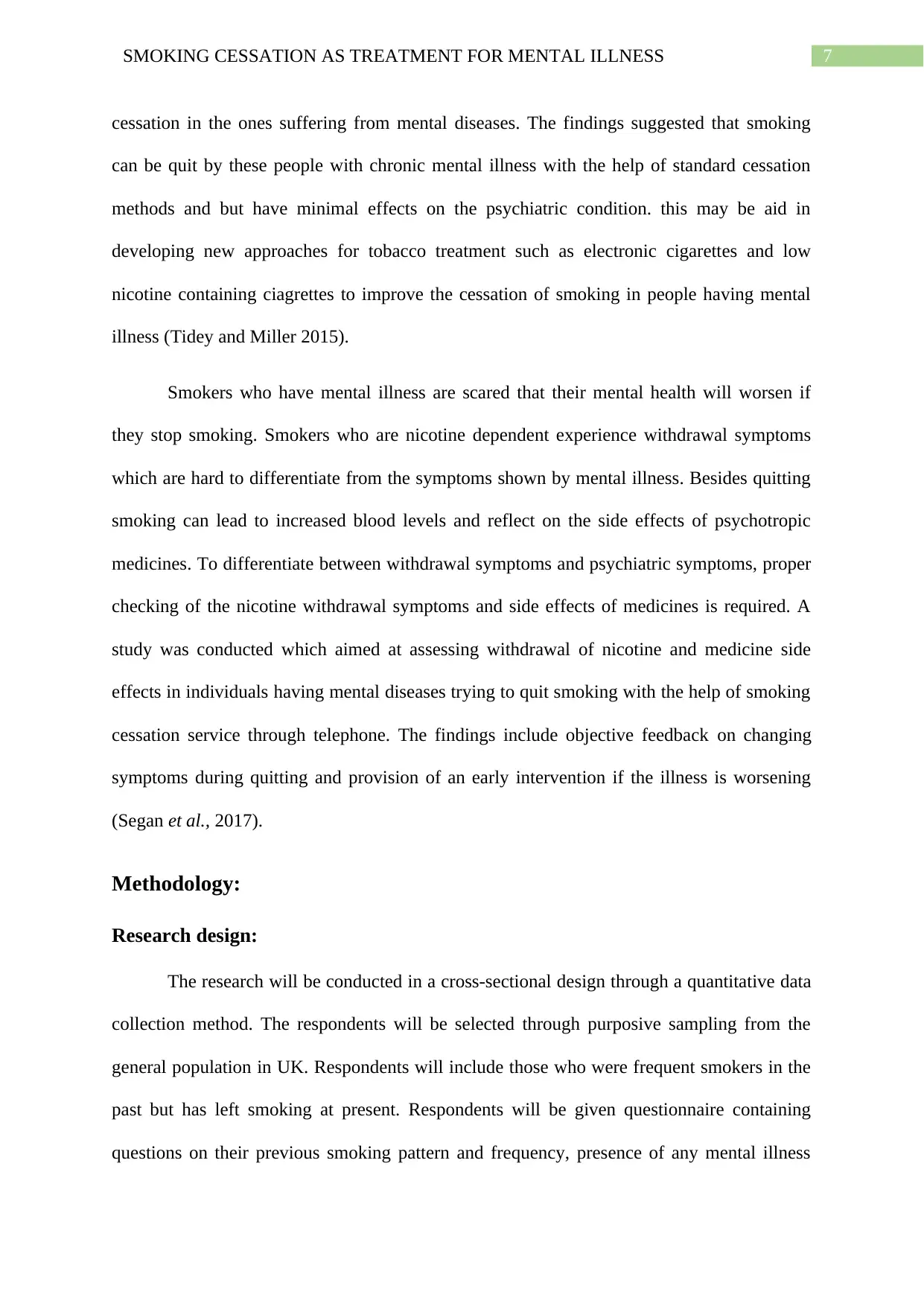
7SMOKING CESSATION AS TREATMENT FOR MENTAL ILLNESS
cessation in the ones suffering from mental diseases. The findings suggested that smoking
can be quit by these people with chronic mental illness with the help of standard cessation
methods and but have minimal effects on the psychiatric condition. this may be aid in
developing new approaches for tobacco treatment such as electronic cigarettes and low
nicotine containing ciagrettes to improve the cessation of smoking in people having mental
illness (Tidey and Miller 2015).
Smokers who have mental illness are scared that their mental health will worsen if
they stop smoking. Smokers who are nicotine dependent experience withdrawal symptoms
which are hard to differentiate from the symptoms shown by mental illness. Besides quitting
smoking can lead to increased blood levels and reflect on the side effects of psychotropic
medicines. To differentiate between withdrawal symptoms and psychiatric symptoms, proper
checking of the nicotine withdrawal symptoms and side effects of medicines is required. A
study was conducted which aimed at assessing withdrawal of nicotine and medicine side
effects in individuals having mental diseases trying to quit smoking with the help of smoking
cessation service through telephone. The findings include objective feedback on changing
symptoms during quitting and provision of an early intervention if the illness is worsening
(Segan et al., 2017).
Methodology:
Research design:
The research will be conducted in a cross-sectional design through a quantitative data
collection method. The respondents will be selected through purposive sampling from the
general population in UK. Respondents will include those who were frequent smokers in the
past but has left smoking at present. Respondents will be given questionnaire containing
questions on their previous smoking pattern and frequency, presence of any mental illness
cessation in the ones suffering from mental diseases. The findings suggested that smoking
can be quit by these people with chronic mental illness with the help of standard cessation
methods and but have minimal effects on the psychiatric condition. this may be aid in
developing new approaches for tobacco treatment such as electronic cigarettes and low
nicotine containing ciagrettes to improve the cessation of smoking in people having mental
illness (Tidey and Miller 2015).
Smokers who have mental illness are scared that their mental health will worsen if
they stop smoking. Smokers who are nicotine dependent experience withdrawal symptoms
which are hard to differentiate from the symptoms shown by mental illness. Besides quitting
smoking can lead to increased blood levels and reflect on the side effects of psychotropic
medicines. To differentiate between withdrawal symptoms and psychiatric symptoms, proper
checking of the nicotine withdrawal symptoms and side effects of medicines is required. A
study was conducted which aimed at assessing withdrawal of nicotine and medicine side
effects in individuals having mental diseases trying to quit smoking with the help of smoking
cessation service through telephone. The findings include objective feedback on changing
symptoms during quitting and provision of an early intervention if the illness is worsening
(Segan et al., 2017).
Methodology:
Research design:
The research will be conducted in a cross-sectional design through a quantitative data
collection method. The respondents will be selected through purposive sampling from the
general population in UK. Respondents will include those who were frequent smokers in the
past but has left smoking at present. Respondents will be given questionnaire containing
questions on their previous smoking pattern and frequency, presence of any mental illness
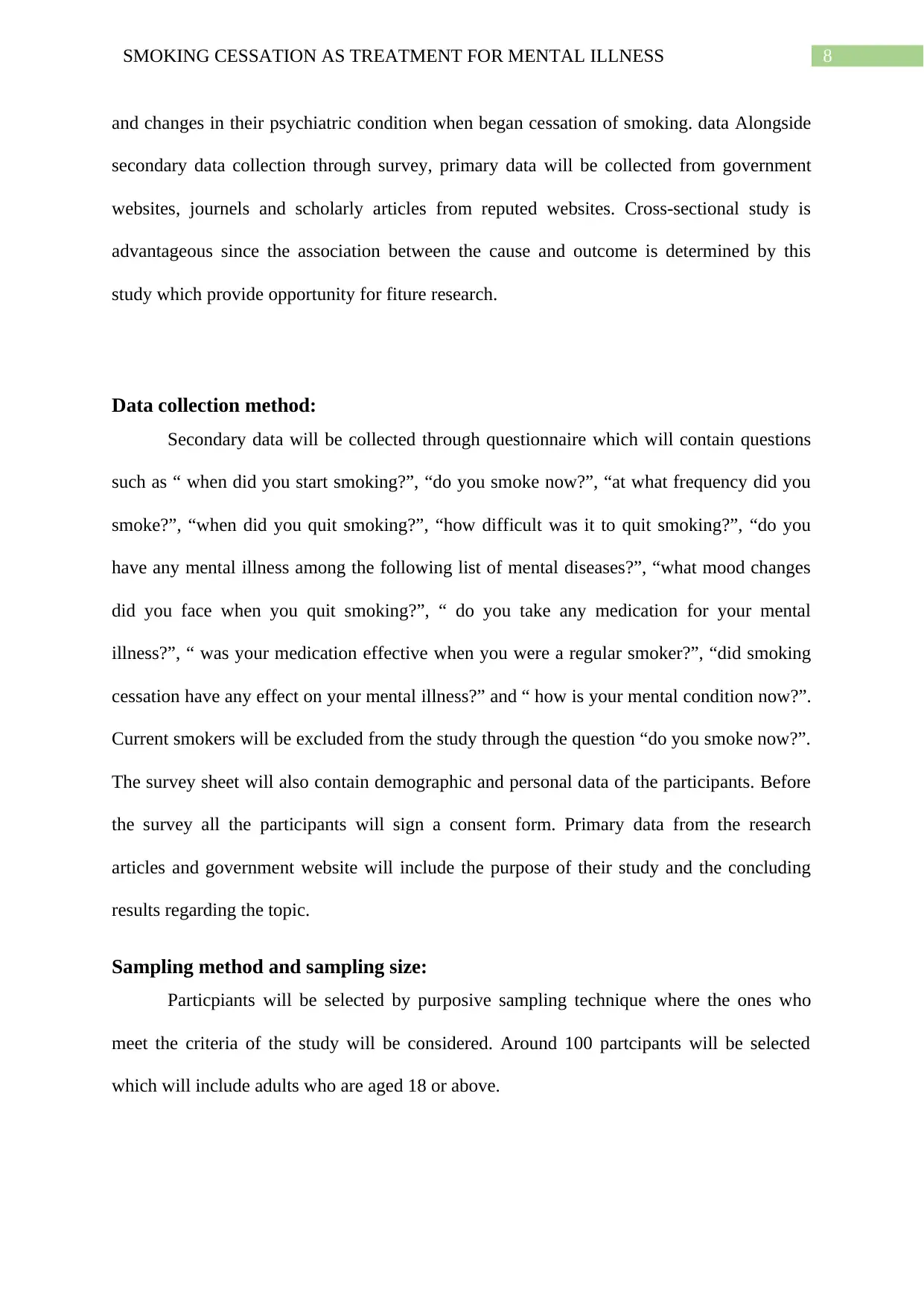
8SMOKING CESSATION AS TREATMENT FOR MENTAL ILLNESS
and changes in their psychiatric condition when began cessation of smoking. data Alongside
secondary data collection through survey, primary data will be collected from government
websites, journels and scholarly articles from reputed websites. Cross-sectional study is
advantageous since the association between the cause and outcome is determined by this
study which provide opportunity for fiture research.
Data collection method:
Secondary data will be collected through questionnaire which will contain questions
such as “ when did you start smoking?”, “do you smoke now?”, “at what frequency did you
smoke?”, “when did you quit smoking?”, “how difficult was it to quit smoking?”, “do you
have any mental illness among the following list of mental diseases?”, “what mood changes
did you face when you quit smoking?”, “ do you take any medication for your mental
illness?”, “ was your medication effective when you were a regular smoker?”, “did smoking
cessation have any effect on your mental illness?” and “ how is your mental condition now?”.
Current smokers will be excluded from the study through the question “do you smoke now?”.
The survey sheet will also contain demographic and personal data of the participants. Before
the survey all the participants will sign a consent form. Primary data from the research
articles and government website will include the purpose of their study and the concluding
results regarding the topic.
Sampling method and sampling size:
Particpiants will be selected by purposive sampling technique where the ones who
meet the criteria of the study will be considered. Around 100 partcipants will be selected
which will include adults who are aged 18 or above.
and changes in their psychiatric condition when began cessation of smoking. data Alongside
secondary data collection through survey, primary data will be collected from government
websites, journels and scholarly articles from reputed websites. Cross-sectional study is
advantageous since the association between the cause and outcome is determined by this
study which provide opportunity for fiture research.
Data collection method:
Secondary data will be collected through questionnaire which will contain questions
such as “ when did you start smoking?”, “do you smoke now?”, “at what frequency did you
smoke?”, “when did you quit smoking?”, “how difficult was it to quit smoking?”, “do you
have any mental illness among the following list of mental diseases?”, “what mood changes
did you face when you quit smoking?”, “ do you take any medication for your mental
illness?”, “ was your medication effective when you were a regular smoker?”, “did smoking
cessation have any effect on your mental illness?” and “ how is your mental condition now?”.
Current smokers will be excluded from the study through the question “do you smoke now?”.
The survey sheet will also contain demographic and personal data of the participants. Before
the survey all the participants will sign a consent form. Primary data from the research
articles and government website will include the purpose of their study and the concluding
results regarding the topic.
Sampling method and sampling size:
Particpiants will be selected by purposive sampling technique where the ones who
meet the criteria of the study will be considered. Around 100 partcipants will be selected
which will include adults who are aged 18 or above.
⊘ This is a preview!⊘
Do you want full access?
Subscribe today to unlock all pages.

Trusted by 1+ million students worldwide
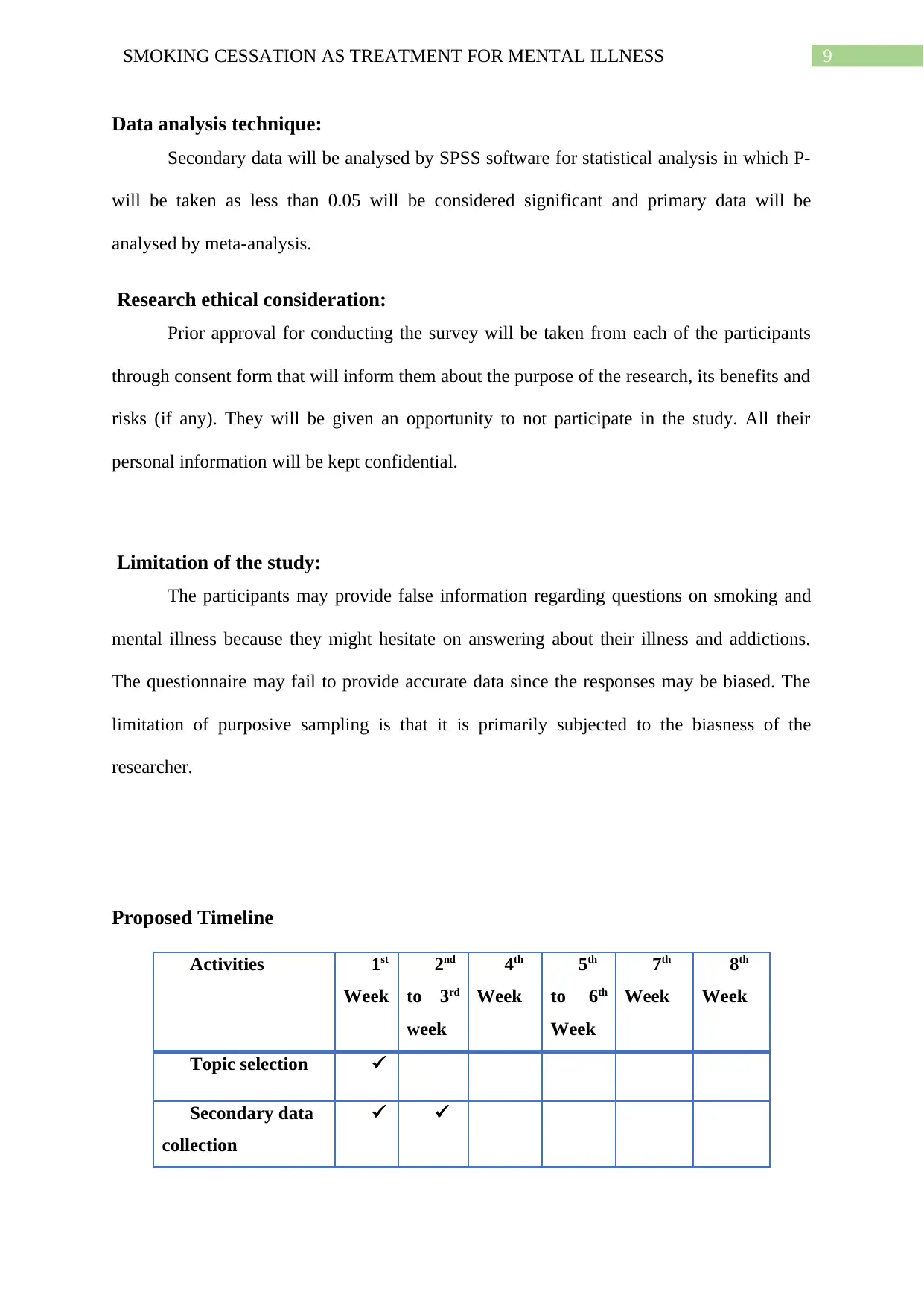
9SMOKING CESSATION AS TREATMENT FOR MENTAL ILLNESS
Data analysis technique:
Secondary data will be analysed by SPSS software for statistical analysis in which P-
will be taken as less than 0.05 will be considered significant and primary data will be
analysed by meta-analysis.
Research ethical consideration:
Prior approval for conducting the survey will be taken from each of the participants
through consent form that will inform them about the purpose of the research, its benefits and
risks (if any). They will be given an opportunity to not participate in the study. All their
personal information will be kept confidential.
Limitation of the study:
The participants may provide false information regarding questions on smoking and
mental illness because they might hesitate on answering about their illness and addictions.
The questionnaire may fail to provide accurate data since the responses may be biased. The
limitation of purposive sampling is that it is primarily subjected to the biasness of the
researcher.
Proposed Timeline
Activities 1st
Week
2nd
to 3rd
week
4th
Week
5th
to 6th
Week
7th
Week
8th
Week
Topic selection
Secondary data
collection
Data analysis technique:
Secondary data will be analysed by SPSS software for statistical analysis in which P-
will be taken as less than 0.05 will be considered significant and primary data will be
analysed by meta-analysis.
Research ethical consideration:
Prior approval for conducting the survey will be taken from each of the participants
through consent form that will inform them about the purpose of the research, its benefits and
risks (if any). They will be given an opportunity to not participate in the study. All their
personal information will be kept confidential.
Limitation of the study:
The participants may provide false information regarding questions on smoking and
mental illness because they might hesitate on answering about their illness and addictions.
The questionnaire may fail to provide accurate data since the responses may be biased. The
limitation of purposive sampling is that it is primarily subjected to the biasness of the
researcher.
Proposed Timeline
Activities 1st
Week
2nd
to 3rd
week
4th
Week
5th
to 6th
Week
7th
Week
8th
Week
Topic selection
Secondary data
collection
Paraphrase This Document
Need a fresh take? Get an instant paraphrase of this document with our AI Paraphraser
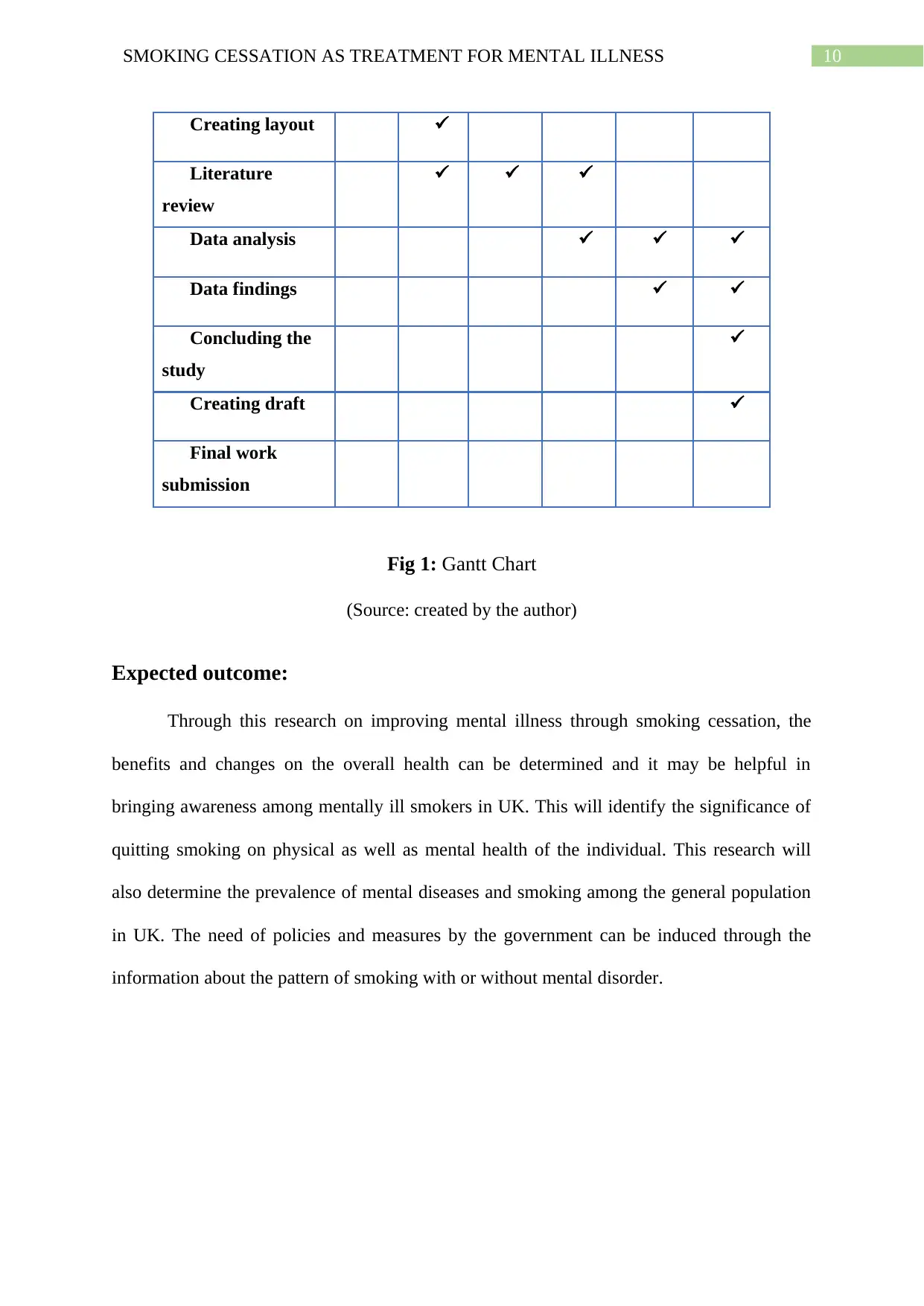
10SMOKING CESSATION AS TREATMENT FOR MENTAL ILLNESS
Creating layout
Literature
review
Data analysis
Data findings
Concluding the
study
Creating draft
Final work
submission
Fig 1: Gantt Chart
(Source: created by the author)
Expected outcome:
Through this research on improving mental illness through smoking cessation, the
benefits and changes on the overall health can be determined and it may be helpful in
bringing awareness among mentally ill smokers in UK. This will identify the significance of
quitting smoking on physical as well as mental health of the individual. This research will
also determine the prevalence of mental diseases and smoking among the general population
in UK. The need of policies and measures by the government can be induced through the
information about the pattern of smoking with or without mental disorder.
Creating layout
Literature
review
Data analysis
Data findings
Concluding the
study
Creating draft
Final work
submission
Fig 1: Gantt Chart
(Source: created by the author)
Expected outcome:
Through this research on improving mental illness through smoking cessation, the
benefits and changes on the overall health can be determined and it may be helpful in
bringing awareness among mentally ill smokers in UK. This will identify the significance of
quitting smoking on physical as well as mental health of the individual. This research will
also determine the prevalence of mental diseases and smoking among the general population
in UK. The need of policies and measures by the government can be induced through the
information about the pattern of smoking with or without mental disorder.
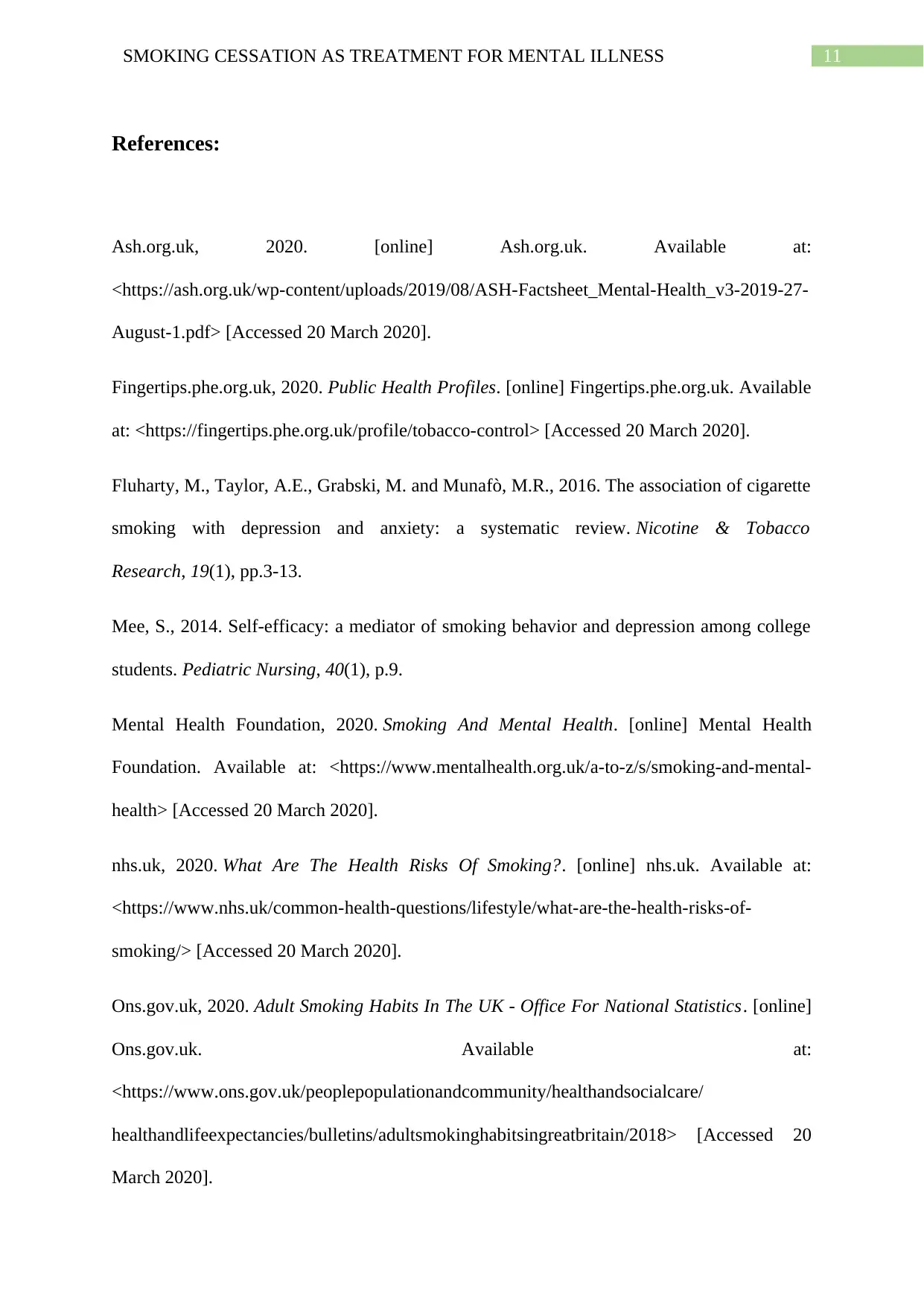
11SMOKING CESSATION AS TREATMENT FOR MENTAL ILLNESS
References:
Ash.org.uk, 2020. [online] Ash.org.uk. Available at:
<https://ash.org.uk/wp-content/uploads/2019/08/ASH-Factsheet_Mental-Health_v3-2019-27-
August-1.pdf> [Accessed 20 March 2020].
Fingertips.phe.org.uk, 2020. Public Health Profiles. [online] Fingertips.phe.org.uk. Available
at: <https://fingertips.phe.org.uk/profile/tobacco-control> [Accessed 20 March 2020].
Fluharty, M., Taylor, A.E., Grabski, M. and Munafò, M.R., 2016. The association of cigarette
smoking with depression and anxiety: a systematic review. Nicotine & Tobacco
Research, 19(1), pp.3-13.
Mee, S., 2014. Self-efficacy: a mediator of smoking behavior and depression among college
students. Pediatric Nursing, 40(1), p.9.
Mental Health Foundation, 2020. Smoking And Mental Health. [online] Mental Health
Foundation. Available at: <https://www.mentalhealth.org.uk/a-to-z/s/smoking-and-mental-
health> [Accessed 20 March 2020].
nhs.uk, 2020. What Are The Health Risks Of Smoking?. [online] nhs.uk. Available at:
<https://www.nhs.uk/common-health-questions/lifestyle/what-are-the-health-risks-of-
smoking/> [Accessed 20 March 2020].
Ons.gov.uk, 2020. Adult Smoking Habits In The UK - Office For National Statistics. [online]
Ons.gov.uk. Available at:
<https://www.ons.gov.uk/peoplepopulationandcommunity/healthandsocialcare/
healthandlifeexpectancies/bulletins/adultsmokinghabitsingreatbritain/2018> [Accessed 20
March 2020].
References:
Ash.org.uk, 2020. [online] Ash.org.uk. Available at:
<https://ash.org.uk/wp-content/uploads/2019/08/ASH-Factsheet_Mental-Health_v3-2019-27-
August-1.pdf> [Accessed 20 March 2020].
Fingertips.phe.org.uk, 2020. Public Health Profiles. [online] Fingertips.phe.org.uk. Available
at: <https://fingertips.phe.org.uk/profile/tobacco-control> [Accessed 20 March 2020].
Fluharty, M., Taylor, A.E., Grabski, M. and Munafò, M.R., 2016. The association of cigarette
smoking with depression and anxiety: a systematic review. Nicotine & Tobacco
Research, 19(1), pp.3-13.
Mee, S., 2014. Self-efficacy: a mediator of smoking behavior and depression among college
students. Pediatric Nursing, 40(1), p.9.
Mental Health Foundation, 2020. Smoking And Mental Health. [online] Mental Health
Foundation. Available at: <https://www.mentalhealth.org.uk/a-to-z/s/smoking-and-mental-
health> [Accessed 20 March 2020].
nhs.uk, 2020. What Are The Health Risks Of Smoking?. [online] nhs.uk. Available at:
<https://www.nhs.uk/common-health-questions/lifestyle/what-are-the-health-risks-of-
smoking/> [Accessed 20 March 2020].
Ons.gov.uk, 2020. Adult Smoking Habits In The UK - Office For National Statistics. [online]
Ons.gov.uk. Available at:
<https://www.ons.gov.uk/peoplepopulationandcommunity/healthandsocialcare/
healthandlifeexpectancies/bulletins/adultsmokinghabitsingreatbritain/2018> [Accessed 20
March 2020].
⊘ This is a preview!⊘
Do you want full access?
Subscribe today to unlock all pages.

Trusted by 1+ million students worldwide
1 out of 13
Related Documents
Your All-in-One AI-Powered Toolkit for Academic Success.
+13062052269
info@desklib.com
Available 24*7 on WhatsApp / Email
![[object Object]](/_next/static/media/star-bottom.7253800d.svg)
Unlock your academic potential
Copyright © 2020–2026 A2Z Services. All Rights Reserved. Developed and managed by ZUCOL.





